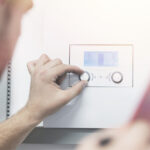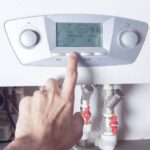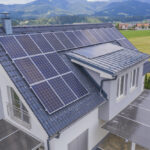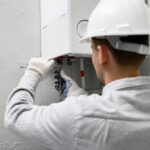Choosing the right condensing boiler for your home is an important decision that can influence both home comfort and long-term energy costs.
With a wide range of options available on the market, finding the right boiler that meets the specific needs of your home and family requires careful consideration of various factors.
In this article, we'll explore it all what you need to know to make an informed choice, from the different types of condensing boilers available, to the selection criteria, up to the advantages of turning to a professional like Mister Plumber for assistance and installation.
What is it a condensing boiler?
A condensing boiler is a high-efficiency heating system designed to recover heat from exhaust fumes, which in traditional boilers is usually dispersed into the atmosphere.
Questo processo di recupero del calore latente del vapore acqueo nei gas di scarico permette alle caldaie a condensazione di raggiungere un’efficienza energetica superiore al 90%, riducendo il consumo di combustibile e le emissioni di gas serra.
Queste caldaie sono ideali per chi cerca di ridurre le bollette energetiche e l’impatto ambientale.
Why choose a condensing boiler?
Condensing boilers offer numerous advantages over conventional models. traditional:
- Energy efficiency: thanks to their ability to recover heat from exhaust fumes, condensing boilers consume less gas to produce the same quantity of heat, reducing heating costs heating.
- Respect for the environment: by consuming less gas, these boilers reduce CO2 emissions, contributing to a cleaner environment.
- Compatibility with modern systems: condensing boilers can be easily integrated with underfloor heating systems and solar panels, further improving energy efficiency.
Factors to consider when choosing a boiler condensing boiler
Before purchasing a condensing boiler, it is important to consider various factors to ensure it meets your specific needs:
- Size of the house: the boiler capacity must be adequate for the size of the house and the number of rooms to be heated.
- Number of bathrooms: if the house has multiple bathrooms, a boiler with a larger capacity to ensure a constant flow of hot water.
- Energy consumption: Consider your current energy consumption and how a condensing boiler could impact your energy costs.
Boiler size and capacity: how to determine the right size
Determining the right boiler capacity is essential to ensure that it can meet the heating and domestic hot water needs of your home without wasting energy.
The capacity of the boiler, expressed in kW, mainly depends on the size of the house, the insulation and the number of people living in the house.
A boiler that is too large can lead to unnecessary costs, while one that is too small may not be able to heat the room adequately.
Types of condensing boilers: wall-mounted, floor-standing, combined and heating only
The boilers condensing boilers are available in different types, each with its own characteristics and applications:
- Wall-mounted boilers: mounted on the wall, they are ideal for homes with limited space.
- Floor-standing boilers: floor-mounted, often more powerful, suitable for larger homes.
- Combi boilers: provide both heating and water domestic hot water heater, ideal for small and medium sized homes.
- Heating only boilers: they only provide heating and require a separate tank for hot water.
Energy efficiency and ErP classification
The energy efficiency of a condensing boiler is measured through the ErP (Energy-related Products) classification, which evaluates the efficiency of an energy product.|| |156
Le caldaie a condensazione di alta qualità avranno una classificazione ErP di classe A o superiore.
This is an important factor to consider as a better energy rating means lower operating costs and a reduced environmental impact .
Cost considerations: purchase price and operating costs
When choosing a condensing boiler, it is important to consider not only the initial purchase price, but also the operating costs at long term.
More efficient boilers may have a higher initial cost, but savings in energy costs can offset this investment over time.
Additionally, maintenance costs may vary depending on the make and model of your boiler.
Condensing boiler maintenance and lifespan
Regular maintenance is essential to ensure your condensing boiler operates at peak efficiency and to extend their life.
Condensing boilers generally last 10 to 15 years, but with adequate maintenance, they can last even longer.
Rely on a qualified technician to annual maintenance is crucial to avoid costly breakdowns and to keep the boiler in good condition.
Tax incentives and benefits for the purchase of condensing boilers
Many governments offer tax incentives and incentives to encourage the installation of high-efficiency condensing boilers.
In Italy, for example, tax deductions are available for the purchase and installation of a new condensing boiler.
These incentives make upgrading to a more efficient boiler an even more convenient choice.
Recommended brands and models of condensing boilers
There are several brands of boilers available on the market high quality condensing stove.
Each brand offers a range of models with different features, such as power, energy efficiency and integrated features.
Consult an expert like Mister Plumber can help you select the model best suited to your specific needs.
How to correctly install a condensing boiler
The correct installation of a condensing boiler is essential to guarantee its efficiency and safety.
Poor installation can lead to gas leaks, low efficiency and potential safety risks.
Therefore, it is essential to use a qualified and certified installer who has experience with condensing boilers.
Differences between condensing boilers and traditional boilers
The main differences between condensing boilers and traditional boilers include energy efficiency, operating costs and the environmental impact.
Condensing boilers are much more efficient, reducing both gas costs and CO2 emissions.
Although they may have a higher initial cost, the long-term energy savings more than justify the investment.
How to choose a qualified installer for your boiler
Choosing a qualified installer is crucial to ensuring your condensing boiler is installed correctly and works to its full capacity.
When choosing an installer, make sure they are certified, have specific experience with condensing boilers and offer a reliable after-sales service.
Domande frequenti sulla scelta della caldaia a condensazione
Q: What is the best condensing boiler for a 100 m² house?
A: It depends on the number of bathrooms and hot water requirements. Generally, a boiler with a capacity of 24-30 kW is adequate for a house of this size.
Q: How much does it cost to install a condensing boiler?
A: The installation cost can vary depending on the complexity of the job and the boiler model chosen, but is usually between 500 and 1,500 euros.
Q: How long does a condensing boiler last?
A: With regular maintenance, a condensing boiler can last between 10 and 15 years.|| |231
Contattare Mister Plumber per una consulenza gratuita e l’acquisto della caldaia
If you are considering purchasing a condensing boiler and would like further information on the best models available and installation costs, contact Mister Plumber.
With years of experience and extensive knowledge of heating solutions, Mister Plumber can help you make the right choice for your needs and ensure a professional and safe installation.
The value of an informed choice
Choosing the right condensing boiler for your home is an important decision that requires a careful analysis of your needs and the specific characteristics of the boiler.
Relying on a professional like Mister Plumber will help you make an informed choice, guaranteeing efficiency, safety and energy saving.











